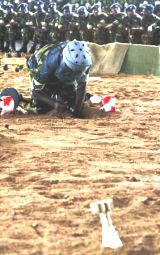UN to remove landmines in Sudan, Somalia, Uganda
Dec 15, 2005 (NAIROBI) — The United Nations on Thursday launched anti-mine program in Nairobi, appealing for 85.4 million US dollars to remove landmines in Sudan, Somalia and Uganda.
 Under the Portfolio of Mine Action Projects 2006, Sudan which is the most heavily mined African nation due to the 21-year civil war will receive 76.5 million dollars, Somalia 5.5 million dollars and Uganda 3.4 million dollars.
Under the Portfolio of Mine Action Projects 2006, Sudan which is the most heavily mined African nation due to the 21-year civil war will receive 76.5 million dollars, Somalia 5.5 million dollars and Uganda 3.4 million dollars.
Speaking at the regional launch in Nairobi, John Dingley, program manager for United Nations Development Program (UNDP) Mine Action Somalia said the projects will cover all aspects of mine action — clearing, marking or fencing off mined areas, assisting victims and their families and providing mine risk education.
“The projects will also involve destroying the countries’ stockpiles of landmines and advocating for universal participating in treaties related to landmines and explosives remnants of war (ERW),” said Dingley.
“More money means shorter time in clearing mines and if we can have more money we can finish clearing these mines in the region soon,” he added.
“We cannot over-emphasize the primacy of Mine Action to humanitarian, development and reconstruction activities. We need a multi-pronged approach to Mine Action,” said UN Somalia Resident and Humanitarian Coordinator, Maxwell Gaylard.
“First, we must deal with mines at source — those who manufacture them should stop doing so as agreed in the Ottawa Convention. Secondly, we need to get rid of the mines that have already been planted that maim and kill people, and also block access to productive land and key services like water sources, schools and health centers,” he said.
“We also particularly need to support those who have been injured by these weapons, through comprehensive inclusion of victim assistance in the wider development context,” added Gaylard, who is also director designate of the UN Mine Action Service.
The World Food Program (WFP) estimates at least 2 million people are affected in securing their daily foods in Sudan and most known casualties occur in vehicle traveling along mined roads.
(Xinhua/ST)
